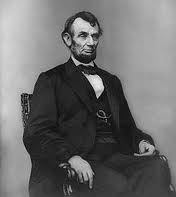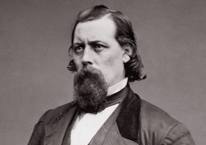 Lincoln’s Lamons included not only Ward Hill Lamon, but also his brother Robert. When Lincoln was elected President in 1860, he insisted that Ward Hill Lamon accompany him to the nation’s capitol. Lamon not only became Lincoln’s confidant, but also his personal body-guard. Ward Hill Lamon had been a law partner of Lincoln’s in Danville, Illinois and became Danville’s prosecuting attorney in 1857. He and Lincoln maintained a close friendship throughout the 1850’s and Lamon worked diligently in all of his friend’s political campaigns. Many of the stump debates could become contentious and Lamon was always on hand to come to Lincoln’s aide, if needed. Ward Hill Lamon was 18 years younger than Lincoln and this youth served the President as not just a guardian, but also as a relief from the daily stress and pressures of the civil conflict. The burdens of the political intrigues of Washington’s power elite cast Lamon into unchartered waters and he also needed a trusted friend and advisor, he chose his brother Robert Lamon.
Lincoln’s Lamons included not only Ward Hill Lamon, but also his brother Robert. When Lincoln was elected President in 1860, he insisted that Ward Hill Lamon accompany him to the nation’s capitol. Lamon not only became Lincoln’s confidant, but also his personal body-guard. Ward Hill Lamon had been a law partner of Lincoln’s in Danville, Illinois and became Danville’s prosecuting attorney in 1857. He and Lincoln maintained a close friendship throughout the 1850’s and Lamon worked diligently in all of his friend’s political campaigns. Many of the stump debates could become contentious and Lamon was always on hand to come to Lincoln’s aide, if needed. Ward Hill Lamon was 18 years younger than Lincoln and this youth served the President as not just a guardian, but also as a relief from the daily stress and pressures of the civil conflict. The burdens of the political intrigues of Washington’s power elite cast Lamon into unchartered waters and he also needed a trusted friend and advisor, he chose his brother Robert Lamon.
Robert Lamon, born in 1835, in Berkeley County, Virginia was 7 years younger than his brother, however he was as big and maintained a less than boisterous demeanor. Except for his bulk, Robert was the exact opposite of his older brother, less educated, but humble and honorable, just the type of individual that Ward Hill Lamon needed to help enforce the unpopular laws and ordinances of the Capitol as U.S. Marshal. Robert was appointed a clerk and Deputy U.S. Marshal, reporting to his brother, charged with maintaining the records and detainees of the District’s jail and protecting the life of President Lincoln.
 Guarding the President was easier said than done. Many assassination attempts were planned and several treasonous conspiracies never came to fruition. Lincoln never wanted these plots exposed or documented in the press, fearing that they might exhibit a weakness in his administration or policies and detract from his personal emphasis on the rebellion. President Lincoln never felt the danger that lurked in the darkness and Robert Lamon’s Official Memorandum of one such escapade reads,
Guarding the President was easier said than done. Many assassination attempts were planned and several treasonous conspiracies never came to fruition. Lincoln never wanted these plots exposed or documented in the press, fearing that they might exhibit a weakness in his administration or policies and detract from his personal emphasis on the rebellion. President Lincoln never felt the danger that lurked in the darkness and Robert Lamon’s Official Memorandum of one such escapade reads,
“In the early part of the night my brother came to me and asked me to join him in the search for Mr. Lincoln. He was greatly disturbed. We drove rapidly to the Soldier’s Home, and as we neared the entrance to the grounds we met a carriage. Behind it we could see in the darkness a man on horseback. My brother, who seemed unusually suspicious, commanded the party to halt. His order was instantly obeyed. Who are you? he demanded. In the same peremptory tone, a voice from within the carriage responded, Why do you ask? The speakers recognized each other. The one in the carriage was Secretary Stanton, and the man behind it was one of his orderlies. Where is Mr. Lincoln? asked Stanton. I have been to the Soldier’s Home and he is not there. I am exceedingly uneasy about him. He is not at the White House? No, said my brother. He is not there. I have looked for him everywhere. We hurried back to the city. Arriving at the White House before Mr. Stanton, we found Mr. Lincoln walking across the lawn. My brother went with him to the War Department, and from there took him to his house, where Mr. Lincoln slept that night and three or four nights following. Mrs. Lincoln being at that time in New York.”
Robt. Lamon
President Lincoln had commanded U.S. Marshal Lamon to strictly enforce all Executive Dictates and District ordinances and laws, many unpopular and at odds with the elected elite. A powerful media of the day, laid the over crowding and imprisonment, lacking habeas corpus, as Ward Hill Lamon’s lack of official responsibility and Seward removed the jail from his sphere of authority, reducing Lamon’s salary. The U.S. Marshal tendered his resignation, which Lincoln refused. Ward Hill Lamon kept up a stellar front, knowing that his main reason for coming to Washington was to protect the life of the President of the United States.
In December of 1864, U.S. Marshal Lamon petitioned for a Cotton Delivery contract for his brother Robert Lamon. The contract was authorized and endorsed by President Lincoln. Lamon’s contract and many others became headline news, generating a congressional investigation. Cotton was not traded or sold for greenbacks, gold and silver species were terms of payment, the only saving grace for the Lamons was the President’s Executive Order that accompanied the contract.
The Cotton Conspiracy and Robert Lamon’s contract do not appear to be the work of Ward’s younger brother. It does seem to be a form of retribution for the U.S. Marshal’s humiliation, at the hands of a hungry press and vindictive political power brokers. Lincoln’s Lamons were all for protecting the President, including Ward’s Brother Robert.
Bummer

